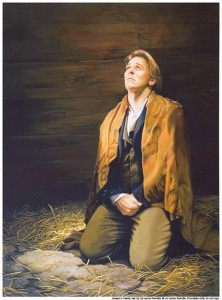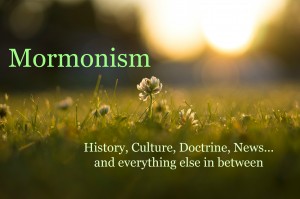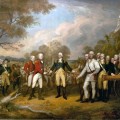Mormons are taught by their church to be patriotic citizens of whatever country they live in. An essential part of our faith is outlined in this Article of Faith: “We believe in being subject to kings, presidents, rulers, and magistrates, in obeying, honoring, and sustaining the law.”
 For Mormons in the United States of America, the Constitution plays an important role in their faith. The Church of Jesus Christ of Latter-day Saints, which is the correct name of the Church, had its beginnings in this country. Mormons believe the nation’s focus on freedom of religion was guided by God in order to allow the gospel to be restored to the Earth at the proper time. They believe the Constitution is an inspired document, although most Mormon leaders today believe that only portions of it was inspired. The original document contains some things that are unimportant and even contains some things we know are morally wrong, such as slavery. The sections of the Constitution that are inspired are those God needed in order to do His eternal work.
For Mormons in the United States of America, the Constitution plays an important role in their faith. The Church of Jesus Christ of Latter-day Saints, which is the correct name of the Church, had its beginnings in this country. Mormons believe the nation’s focus on freedom of religion was guided by God in order to allow the gospel to be restored to the Earth at the proper time. They believe the Constitution is an inspired document, although most Mormon leaders today believe that only portions of it was inspired. The original document contains some things that are unimportant and even contains some things we know are morally wrong, such as slavery. The sections of the Constitution that are inspired are those God needed in order to do His eternal work.
There is no official list of which parts of the Constitution are inspired, although freedom of religion is certainly on every Mormon’s list. Looking at what some Mormon leaders have said can help us to find a basic consensus, however, and let us see what Mormons consider to be inspired.
In the current Church leadership, Dallin H. Oaks is considered the foremost authority on constitutional issues. Prior to becoming a Mormon apostle, he was a lawyer and a professor of law, he served on a state Supreme Court, and he helped to draft the Illinois state constitution’s Bill of Rights. He speaks often on Constitutional issues, both inside and outside the Church. On the issue of the Constitution’s divinity, he said:
Reverence for the United States Constitution is so great that sometimes individuals speak as if its every word and phrase had the same standing as scripture. Personally, I have never considered it necessary to defend every line of the Constitution as scriptural. For example, I find nothing scriptural in the compromise on slavery or the minimum age or years of citizenship for congressmen, senators, or the president. President J. Reuben Clark, who referred to the Constitution as “part of my religion,”also said that it was not part of his belief or the doctrine of the Church that the Constitution was a “fully grown document.” “On the contrary,” he said, “We believe it must grow and develop to meet the changing needs of an advancing world.”(Elder Dallin H. Oaks, The Divinely Inspired Constitution, Ensign, February 1992).
 Elder Oaks pointed out that Joseph Smith did not believe the Constitution was perfect, either. The Fourteenth amendment made it finally possible for the federal government to force states to honor the Bill of Rights. Because that had not been present originally, states were permitted to persecute Mormons—and any other religious people—at will. The imperfection of the document made the atrocities aimed at the early Mormons possible and provided the federal government with an excuse to stay out of the problem.
Elder Oaks pointed out that Joseph Smith did not believe the Constitution was perfect, either. The Fourteenth amendment made it finally possible for the federal government to force states to honor the Bill of Rights. Because that had not been present originally, states were permitted to persecute Mormons—and any other religious people—at will. The imperfection of the document made the atrocities aimed at the early Mormons possible and provided the federal government with an excuse to stay out of the problem.
J. Reuben Clark, an attorney who served in Calvin Coolidge’s administration and who was later a Mormon apostle, felt only three parts of the Constitution were definitely inspired: the balance of power between the three branches of government; freedom of speech, press, and religion, and the equality of all men before the law. Dallin H. Oaks agrees with those three and adds two more: popular sovereignty and the rule of law. He also considers the basic concept of a Bill of Rights to be inspired.
I have always felt that the United States Constitution’s closest approach to scriptural stature is in the phrasing of our Bill of Rights. Without the free exercise of religion, America could not have served as the host nation for the restoration of the gospel, which began just three decades after the Bill of Rights was ratified. I also see scriptural stature in the concept and wording of the freedoms of speech and press, the right to be secure against unreasonable searches and seizures, the requirements that there must be probable cause for an arrest and that accused persons must have a speedy and public trial by an impartial jury, and the guarantee that a person will not be deprived of life, liberty, or property without due process of law. President Ezra Taft Benson has said, “Reason, necessity, tradition, and religious conviction all lead me to accept the divine origin of these rights.”
A Mormon book of scripture called the Doctrine and Covenants, which contains modern revelations, tells us:
Therefore, it is not right that any man should be in bondage one to another. And for this purpose have I established the Constitution of this land, by the hands of wise men whom I raised up unto this very purpose, and redeemed the land by the shedding of blood (Doctrine and Covenants 101:79-80).
 This verse tells us just how important the Constitution is to God’s plan. Although there were no prophets on the earth at the time the Constitution was written, and these men were not prophets, they were inspired in the work. While they did not always do things the way God would want them to do, God did guide them in those areas that were essential to allow His work in modern times to continue.
This verse tells us just how important the Constitution is to God’s plan. Although there were no prophets on the earth at the time the Constitution was written, and these men were not prophets, they were inspired in the work. While they did not always do things the way God would want them to do, God did guide them in those areas that were essential to allow His work in modern times to continue.
While reading a book on how the Constitution came to be, I became aware of an interesting pattern. Many times, the entire work of the Constitution was in danger and it looked like the delegates would simply give up. However, each time, the crisis came on a Saturday. They did not officially meet on the Sabbath. They would attend Church services and then some would meet informally in small groups. Each time, these quiet Sabbath-influenced meetings led to compromises that allowed the process to resume successfully. It was interesting to me that God used the Sabbath, and perhaps the reminders of eternal principles found in their church services, to rescue His project. Many of the Founding Fathers admitted that God’s hand had clearly been at work as they built a document that was seemingly impossible to create, given the great diversity of our nation and the lack of a national identity. At that time, if a person was asked what country he lived in, he named his state. He identified much more strongly as a citizen of his state than he did as a citizen of his country. It would not be until after the Civil War that Americans began to focus on national unity. Given this, it is truly a miracle that the Constitution ever came to be written or even to be ratified.
Rights and Responsibility
When Mormon leaders speak of the Constitution, they speak of its divine origin and the rights it gives that make it possible for us to live our faith openly. However, they also remind Mormons that these rights come with responsibilities. If we want to make the system work, they tell us, we must be righteous, participate in our government by voting, volunteering, and serving in other ways, and we must be good citizens. We must defend the Constitution and make certain it continues to protect freedom of religion.
They remind us that although God has participated in the creation of this nation, we have His protection only so long as we earn it:
Great are the promises concerning this land of America. We are told unequivocally that it “is a choice land, and whatsoever nation shall possess it shall be free from bondage, and from captivity, and from all other nations under heaven, if they will but serve the God of the land, who is Jesus Christ” (Ether 2:12). This is the crux of the entire matter—obedience to the commandments of God.
The Constitution under which we live, and which has not only blessed us but has become a model for other constitutions, is our God-inspired national safeguard ensuring freedom and liberty, justice and equality before the law (Gordon B. Hinckley, The Times in Which We Live, General Conference of The Church of Jesus Christ of Latter-day Saints, October, 2001).
About Terrie Lynn Bittner
The late Terrie Lynn Bittner—beloved wife, mother, grandmother, and friend—was the author of two homeschooling books and numerous articles, including several that appeared in Latter-day Saint magazines. She became a member of the Church at the age of 17 and began sharing her faith online in 1992.







